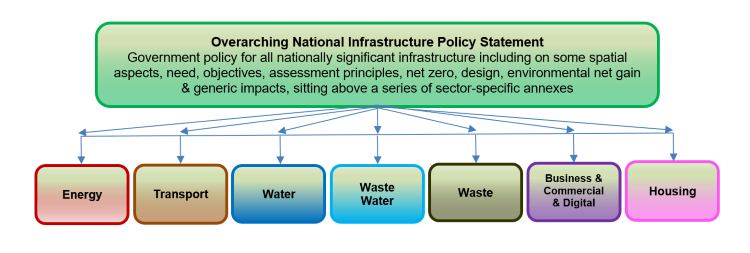The wheels could soon fall off the planning regime for key infrastructure projects unless urgent changes are made, say Robbie Owen and Jan Bessell of Pinsent Masons.
The nationally significant infrastructure projects (NSIPs) planning regime in England and Wales is in danger of losing its mojo. We propose that government should create one overarching 'super' National Policy Statement (NPS), because the storm clouds are gathering over the rather beleaguered and rapidly ageing suite of NPSs that underpin the NSIPs regime. Judicial reviews are on the increase. There is a growing feeling that unless something is done, the wheels could soon begin to fall off the regime that has been working well since 2010.
Background
In 2007, the Labour government set out its vision for a new system of planning for major infrastructure. In its white paper it recognised that “national policy is not sufficiently clear and responsive” and proposed a series of NPSs to provide the government’s objectives for the development of nationally significant infrastructure in a particular sector and how this could be achieved in a way which delivered sustainable development. The legal significance of NPSs was then set in stone by the Planning Act 2008 as well as the procedures for their designation and review.
Nine NPSs were designated within five years of the 2008 Act. However, that initial rush has not been followed through, with only three new NPSs since then. None of the NPSs has yet completed a formal reviewed despite the original intention to ensure that NPSs remain up to date by being reviewed at least every five years.
The problem
So, the documents that form a cornerstone of the 2008 act are inconsistent and also now quite aged. They are increasingly generating challenges in court – leading to uncertainty for all, cost and delay. They have increasingly been developed in a piecemeal way over time with no overarching consistent guiding principles, standards and policy, or assessment criteria and decision-making tests. This has led to the inconsistent assessment, decision-making and treatment of issues such as climate change adaptability. Neither do the NPSs account for many changes in government policy – not least on climate change and net zero, or technological innovations such as solar, energy storage and hydrogen power at scale.
This is leaving infrastructure project promoters facing the problem NPSs were specifically designed to avoid - uncertainty as to whether there is clear government policy support and an established national need for their projects. This will only continue to deteriorate as further judicial reviews are doubtless brought - causing uncertainty, cost, risk and delay to projects and undermining the nation's economic recovery and 'levelling up'.
There is now the strong impression that government has put most NPS issues onto the ‘too difficult’ pile. Whitehall now seems almost institutionally incapable of delivering them.
The opportunity
So, it is now imperative that the government considers the future of the NPSs. It is our proposal that it should look to harness the National Infrastructure Commission's valuable work in its National Infrastructure Assessment, demonstrating using hard evidence the ‘need’ for infrastructure, and the intended five-yearly cycle of national infrastructure assessments and resulting national infrastructure strategies.
Our proposal
Our proposal would provide consistency and certainty at a national level for all nationally significant infrastructure. It can be simply illustrated:

- The government should create one overarching 'super' NPS from its National Infrastructure Strategy. This would set out the government's high level priorities, needs, objectives, assessment principles and decision-making tests, and any standards for new infrastructure across all sectors. It would integrate economic, environmental, design and social objectives to deliver sustainable development that supports transition to net zero. This would enable a consistent and well-evidenced basis to establish policy, without repetition and inconsistencies for different sectors and by different departments.
- The overarching NPS would be supported by sector-specific annexes. Both could draw on the existing suite of NPSs but those would all be withdrawn once the overarching NPS and annexes had been formally put in place following consultation and Parliamentary scrutiny. This would avoid the need for a series of multiple reviews of the current NPSs.
- The whole package would then be reviewed every five years thereafter as part of the government's response to each National Infrastructure Assessment. This would be much more manageable than the current review process.
- Housing should be seen as national infrastructure and so be included in this new overall framework. That would, however, require primary legislation - the only aspect of this proposal that would.
This new approach would allow NPSs, the cornerstone of the Planning Act 2008 regime, to be updated holistically - retaining certainty, meeting the challenges of the 2020s and in an efficient and agile way, keying into a five yearly process. What's not to like?
Robbie Owen is a partner and head of infrastructure planning and Jan Bessell is a strategic planning adviser at Pinsent Masons.
- Later this week, Infrastructure Intelligence will be hosting an online panel debate on how the planning system can help deliver the economic infrastructure element of the government's "build, build, build" agenda. A recording of the debate together with a news report on its conclusions will be available next week on our website.

